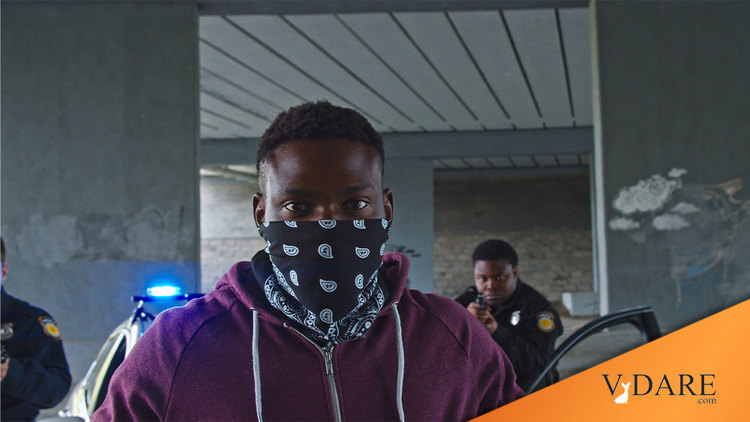
Why Is Violent Crime Down According To The National Crime Victimization Survey?
11/07/2022
I apologize for rambling on about crime statistics, but interest in them is high at the moment, and I do know more on this momentarily fashionable subject than other pundits.
Murder and auto theft are the best counted crimes, so I trust those trends more than for lesser crimes for which reporting is spottier.
Interestingly, traffic fatalities also exploded during the "racial reckoning" following George Floyd’s death: pic.twitter.com/6iTV4IQGuE
— Steve Sailer (@Steve_Sailer) November 5, 2022
On the other hand, the federal National Crime Victimization Survey reports a sharp drop in violent crime from 2019 to 2020 and little change from 2020 to 2021. This finding deserves a serious response.
The NCVS is a serious study going on for the last half century with a huge sample size of a quarter of a million. As I wrote about the NCVS in 2020:
But, many would object, aren’t FBI crime statistics, which are based on who is charged with a crime, just a giant conspiracy by law enforcement to make blacks look bad?
Well, that criticism was made way back in the liberal 1960s as well. (Indeed, just about every current critique of crime data imaginable was taken seriously back in the ’60s and looked into at length.)
So, since 1972 the Census Bureau and the Bureau of Justice Statistics (which sounds like where Batman’s nerdy cousin would work) have been teaming up on the annual National Crime Victimization Survey. In 2019, 249,000 people in 155,000 different households were asked whether they had been a crime victim over the previous six months.
The NCVS has certain advantages over the FBI crime statistics collected by the police.
For example, while about 30 percent of local police departments still use the obsolete Adam 12–era ethnic categories in which whites and Hispanics were lumped together as “Caucasians,” the NCVS uses 21st-century designations so we can distinguish among different nonblack groups.
Moreover, asking people if they were victims of crime can get around problems with asking police departments, which might have different policies for collecting data on minor crimes and might have highly different rates of likelihood that local residents will bother to report crimes.
One downside of the NCVS, though, is that victims of murder, the most serious crime, aren’t around anymore to answer questions. In contrast, the FBI’s murder statistics are fairly reliable because a dead body demands attention.
On the other hand, many lesser crimes are not reported to the police. Whites in 2019 said that they reported 37 percent of their violent victimizations to the police versus about 49 percent among other races. So the NCVS may do a better job of covering lesser crimes than murder than do [sic] the FBI’s Uniform Crime Reporting.
Another issue with the NCVS is of course that it relies on unverified responses. That’s a fundamental aspect of the methodology. Also, the initial interviews are conducted of all members of a household over 11, so it’s assumed that some cases of domestic violence are swept under the rug by interviewees. Moreover, the NCVS only interviews in homes, not in jails and homeless encampments. And hardcore criminals probably seldom agree to be interviewed.
But the CDC reports that black homicide deaths were 43% higher in 2021 than in 2019. How to reconcile that amazing statistic with the National Criminal Victimization Survey finding no increase in lesser violent victimizations among their respondents?
My guess is that NCVS survey respondents are a self-selected group that tends to be more pro-social, more trusting of the government than in general. That’s why they volunteer to let the feds come to their home and ask them personal questions about crime.
So, my guess is that NCVS respondents who chose to participate in the 2020-21 surveys of their crime victimizations have tended during the pandemic more to be obedient pro-social social distancers. They have gotten in fewer bar brawls recently because they haven’t gone to as many bars due to COVID.
In contrast, the kind of person who, say, nearly got hit by gunfire at an inner city summer block party has a general policy of never talking to anybody in the government about criminal activity they’ve witnessed, been victimized by, or perpetrated.
Because snitches get stitches.
For example, NYC subway ridership remains at about 5/8th the pre-pandemic level. Because the top 3/8th of former riders are working from home, driving or taking Uber, or have moved to Miami, total criminal victimizations on the NYC might have gone down. Yet riding the subway has perhaps gotten scarier for the remaining 5/8ths because most of the national sales manager Haven Monahan–types who belonged to fraternities and used to intimidate the schizophrenics and low lifes into playing it straight are now working from home.
Few these days can conceptualize that work-from-home emptying the big cities of Ex-Frat White Guys has made the streets scarier because Ex-Frat White Guys are the designated bad guys in the Narrative, whereas in real life yuppies are good guys who make American urban life better.
